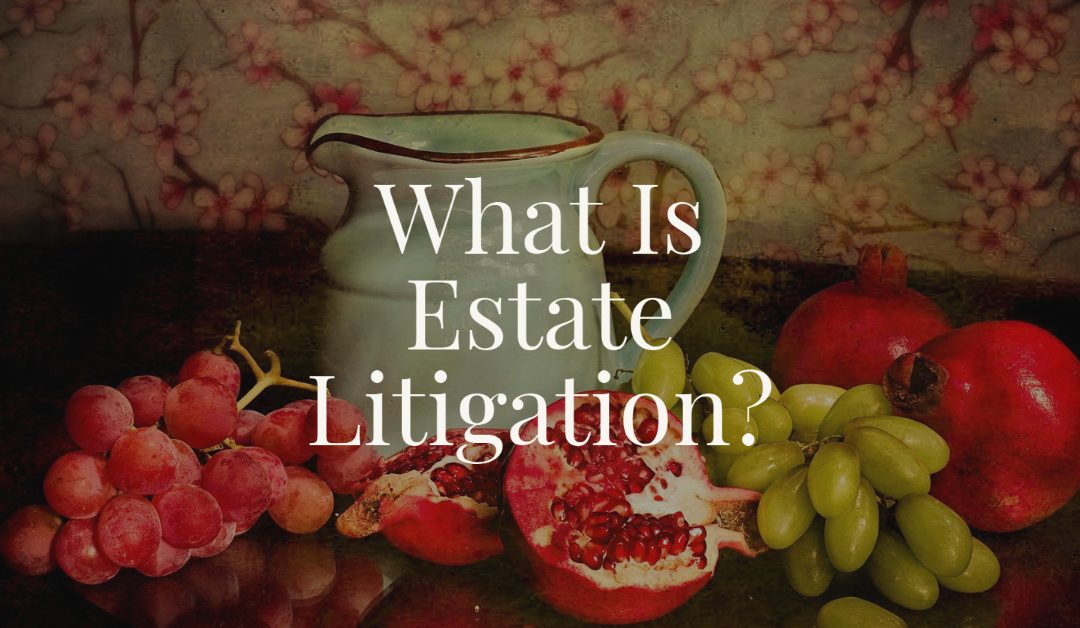Is the settlement of your family estate taking too much time and money? Do you have unresolved issues regarding an estate with family members or friends?
These issues can be emotionally draining and cause pain and distrust among family members. Whether you are an heir or an executor of an estate, a trustee, or another beneficiary, tensions can run high trying to settle these types of matters. Settling an estate can be an exhausting process involving courtroom drama.
Estate litigation is the process by which attorneys represent clients in the matter of estate settlement. Cases involving this type of litigation come up for many reasons. Let’s take a look at some of the more common litigious battles seen by attorneys.
Property Recovery
Executors and administrators are in charge of counting and valuing an estate. However, sometimes family members will try to walk right in and take what they desire from the estate.
Because administrators and executors are responsible for the correct accounting of an estate, they can even be sued personally if the taxes are filed incorrectly. It is their job to account for all assets properly. Attorneys often represent an estate’s executors and administrators when some or much of an estate is missing or unaccounted for. The missing assets could be property or monetary assets.
Attorneys also often work with family members who accuse the executor or administrator of stealing assets from the estate.
Creditors
When someone passes away, the administrator accounts for what is owned by the estate but also what is owed. Part of the responsibility of the estate is to pay any outstanding debts.
Creditors often make claims for payment of a debt. Not all creditors who make a claim are owed money by the estate. If the executor refuses to pay for valid reasons, the administrator/executor and creditor can end up needing attorneys to negotiate or handle a court battle.
Interpretation of Wills and Trusts
Wills and Trusts should be clearly written and make sense according to the law. However, depending on when and who helped to draw them up, they can be confusing in their language and even contradictory in legal terms. If beneficiaries are pitted against each other in their interpretation of either type of document, a legal battle can erupt. An estate litigation attorney represents the rights of their client in this challenging situation.
Removal of Administrator or Executor
Sometimes an executor or administrator does not faithfully abide by their duties. Others who are part of the estate settling take notice and prosecute to have them removed from the power they hold on the estate. Attorneys represent the executor/ administrator, and other attorneys represent the family who is striving to have them removed.
Guardianship
If a younger person passes away with children still in their care, there may be legal trouble deciding who should be the children’s guardian. Clients consult attorneys to represent them in contested guardianship cases.
There are also cases involving the misuse of funds belonging to minors or incompetent adults. As a fiduciary agent caring for a ward’s finances, you must act in the best interest of the child or adult you are caring for. When someone misuses or misappropriates funds, attorneys represent the ward or the fiduciary in court. There are also cases involving families who want a guardian removed because of inappropriate conduct with finances.
Often, older adults will sign a power of attorney, giving the right to handle their finances to someone else. If someone has abused this power, they open themselves to prosecution for this type of financial abuse. This is called a breach of fiduciary duty claim.
Real Estate
Sometimes an estate cannot afford to pay its debts without selling some of its real property. In these cases, a judge might hear a petition to sell real estate to pay the debts. Other family members or beneficiaries may disagree, and a court battle ensues.
Other Cases Litigation Attorneys Handle
- Surplus Funds cases
- Name Change Petitions
- Appeals of Clerk Decisions to Superior Court and higher-level appellate courts
- Motions requiring action or accounting on the part of a fiduciary (like an executor, agent under a power of attorney, etc.)
- Clerk level and Superior Court level spousal allowance (year’s allowance) claims on behalf of spouses and defense of the same.
- Trust Modifications
- Trust Litigation
- Petitions involving illegitimate children claiming a right to an estate
- Declaratory judgment actions to invalidate a deed, determine the rights of parties, etc.
Estate Litigation is a varied and vital part of our legal system in the United States. Attorneys that practice this type of law are skilled in knowing which types of cases merit a courtroom battle and which could be settled more easily with a negotiation. In most estate cases, it isn’t easy to see how to handle the situation because emotions are high, and the people involved are often close family relations. If you face a struggle involving these types of estate issues, consult an experienced estate litigation attorney to find solutions.

